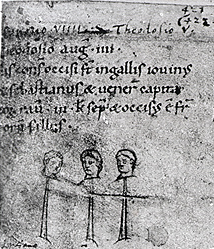Minor and Fragmentary Historians of Late Antiquity
Minor and Fragmentary Historians of Late Antiquity (KFHist)
Launched in 2012, this long-term project aims to publish Greek and Latin texts of minor and fragmentary historians of Late Antiquity. The edited texts will be accompanied by a full commentary and a German translation.
Project
The bulk of written historical sources from Late Antiquity is unfortunately lost. In some instances, however, it can be retrieved—albeit only partially—through later authors, who in turn composed their works up to half a millenium later. The loss is all the more deplorable, since the significance of Late Antiquity for the subsequent political and cultural development in Europe is hardly overrated. This crucial period witnessed the separation of the Roman empire into an eastern and a western entity from which emerged the Byzantine empire and the various Barbarian kingdoms informing the Middle Ages. Besides, during the 4th century, Christianity advanced from being persecuted to becoming the state religion, all the while embracing the intellectual pagan mind-set, which permitted the copying and transmission of the likes of Homer, Plato, Cicero and Virgil in medieval monasteries.
But above all, Late Antiquity is generally associated with highly dramatic events usually known as the “Decline and Fall of the Roman Empire” and the “Barbarian Invasions.” Our knowledge of the notorious Attila the Hun, for instance, hinges primarily on Priscus, whose actual History is lost. Preserved in Byzantine excerpts, however, his work contains a detailed report of an embassy to the court of Attila, culminating in a banquet with the dreaded Hun himself: "A luxurious meal, served on silver plate, had been made ready for us and the barbarian guests, but Attila ate nothing but meat on a wooden trencher. In everything else, too, he showed himself temperate; his cup was of wood, while to the guests were given goblets of gold and silver. His dress, too, was quite simple, affecting only to be clean. The sword he carried at his side, the latchets of his Scythian shoes, the bridle of his horse were not adorned, like those of the other Scythians (i.e. Huns and East Germanic people), with gold or gems or anything costly. (Translation by J. B. Bury.)
Because late antique historiography lacks a standard corpus such as the Fragmente der griechischen Historiker (FgrHist) established by Felix Jacoby for the Greek fragmentary historians of classical antiquity, one is thus forced to revert to rather inadequate and incomplete old compilations.
The editorial project Kleine und fragmentarische Historiker der Spätantike (Minor and Fragmentary Historians of Late Antiquity) comprises nearly 90 authors and anonymous works ranging from the 3rd through the 6th centuries. It includes Greek and Latin authors, secular and church historians, fragmentary and "minor" authors, that is authors whose works are seldom published separately, yet don't appear in collections of fragments (e.g. Polemius Silvius and the so-called Ravenna Annals), individual historians and securely postulated anonymous works (e.g. Enmann's Kaisergeschichte).

The Ravenna Annals, for instance, provide us with brief notes on events in the Western Empire during the 4th through 6th centuries, among which the remark that the severed heads of Iovinus and Sebastianus were sent to Ravenna on August 8, 412, after their failed usurpation attempt in Gaul, and that their brother Sallustius was killed. The cathedral library of Merseburg holds an 11th century parchment which contains drawings that go back to the 6th century and illustrate events of the 5th century: The depiction below shows the very three heads on stakes (cf. B. Bischoff / W. Koehler, Eine illustrierte Ausgabe der spätantiken Ravennater Annalen, in: Medieval Studies in Memory of A. Kingsley Porter, Cambridge [Mass.] 1939, I 125-138, particularly 127. 131).
The texts, edited in close co-operation by a team of philologists and ancient historians, will appear in the original language together with an apparatus criticus, a German translation and a commentary covering both philological and historical matters.
The 15-year editorial project is funded with a € 3.000.000 grant by the Nordrhein-Westfälische Akademie der Wissenschaften und der Künste and the Union der deutschen Akademien der Wissenschaften (Akademienprogramm).
Directors and general editors are Prof. Dr. Bruno Bleckmann, Institut für Geschichtswissenschaften, and Prof. Dr. Markus Stein, Institut für Klassische Philologie.
Published volumes
- KFHist A 1-4, 6-8: Asinius Quadratus | Nikostratos of Trapezunt | Philostratos of Athens | Ephoros of Kyme | Eusebios | Eusebius of Nantes | Onasimos/Onesimus
B. Bleckmann / J. Groß (eds.), Historiker der Reichskrise des 3. Jahrhunderts. Vol. 1, Paderborn 2016. - KFHist B 1/4: B. Bleckmann / M. A. Nickbakht / C. Scardino (eds.), Enmannsche Kaisergeschichte / Rufius Festus, Breviarium, Paderborn 2022.
- KFHist B 2: M. A. Nickbakht / C. Scardino (Hgg.), Aurelius Victor, Historiae Abbreviatae Paderborn 2021.
- KFHist B 3: Eutropius, Breviarium ab urbe condita, editiert, übers. und komm. von B. Bleckman/J. Groß, Paderborn 2018.
- KFHist B 5-7: Origo gentis Romanorum – Polemius Silvius – Narratio de imperatoribus
B. Bleckmann / J.-M. Kötter/ M. A. Nickbakht / I.-Y. Song / M. Stein (eds.), Paderborn 2017. - KFHist E 7: Philostorgios
B. Bleckmann / M. Stein (eds.), Philostorgios, Kirchengeschichte. Vol. 1: Einleitung, Text und Übersetzung; Vol. 2: Kommentar, Paderborn 2015. - KFHist G 1-4: Consularia Constantinopolitana | Sokrates, Fastenquelle | Berlin Chronicle | Alexandrian World Chronicle
M. Becker / B. Bleckmann / J. Groß / M. A. Nickbakht (eds.), Consularia Constantinopolitana und verwandte Quellen, Paderborn 2016. - KFHist G 5/6: Prosper Tiro, Chronicle | Laterculus regum Vandalorum et Alanorum
M. Becker / J.-M. Kötter (eds.), Prosper Tiro, Chronik - Laterculus regum Vandalorum et Alanorum, Paderborn 2016. - KFHist G 7/8: Gallic Chronicle of 452 | Gallic Chronicle of 511
J.-M. Kötter / C. Scardino (eds.), Gallische Chroniken, Paderborn 2016.
Links
Nordrhein-Westfälische Akademie der Wissenschaften

